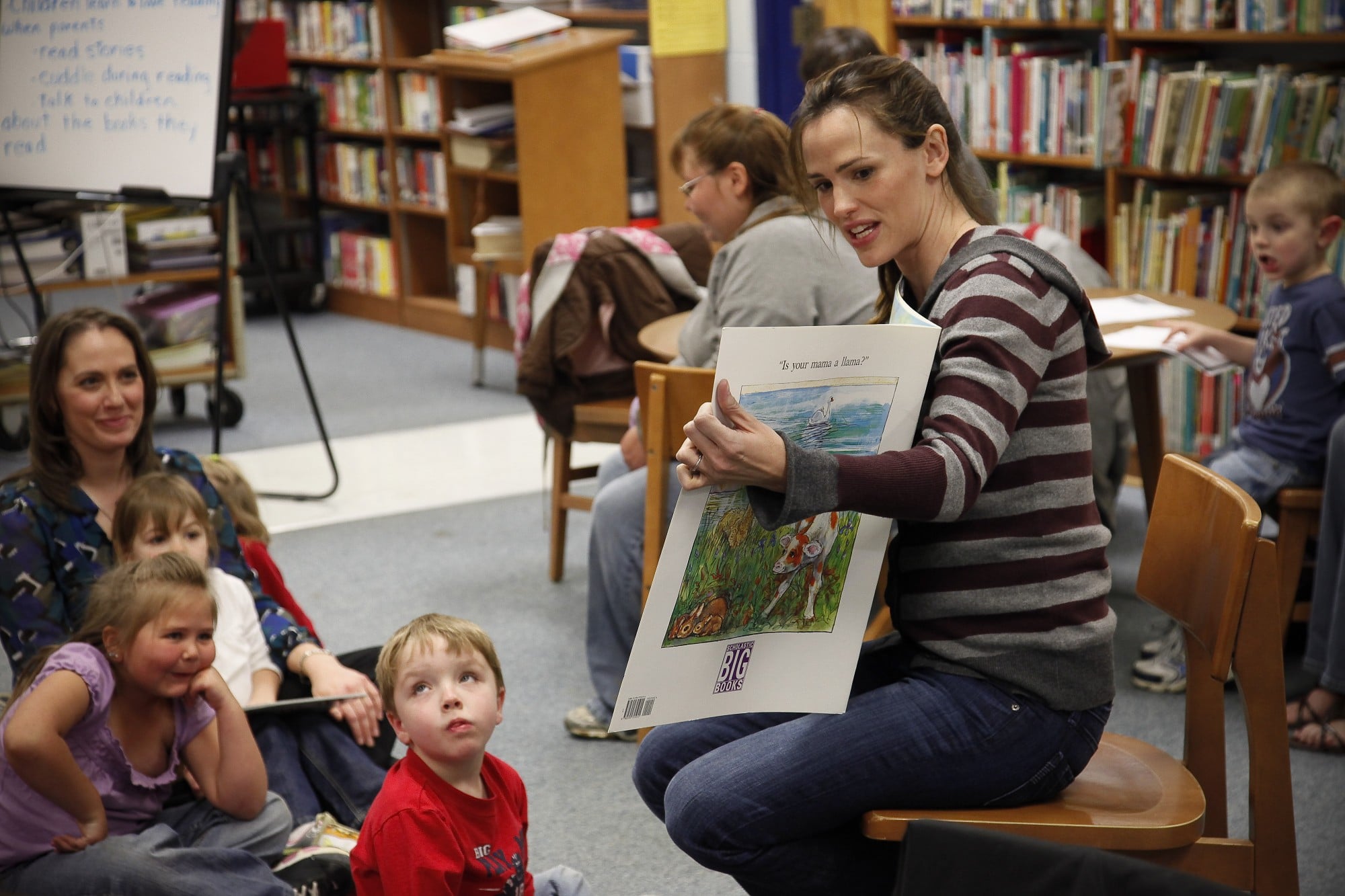
by Elizabeth Atalay | Sep 30, 2014 | 2014, Awareness, Childhood, Education, Humanitarian, Interviews, Preschool, Save The Children, School, Social Good, USA, World Interviews
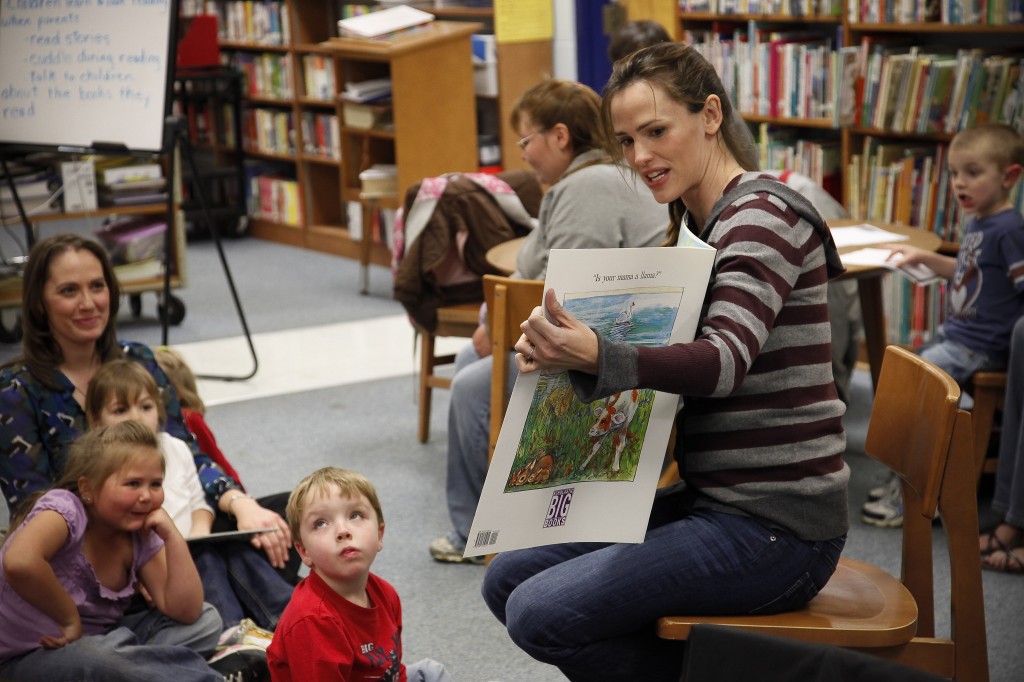
Actor Jennifer Garner visits with school children who are participants of a Save the Children reading program at LBJ Elementary School in, Ky. Photo by David Stephenson
“OPTIMISM”, Jennifer Garner chose the word optimism when we interviewed her about her work with Save The Children and the #FindTheWords campaign. My word had been “LEAD”, Jen Burden’s was “CREATE”, and Stacey Hoffer Weckstein of Evolving Stacey, who did the interview with me, had “COURAGE”. These were our words in the 30 words, 30 days blogger challenge for #FindTheWords to represent the 30 million fewer words kids would learn in homes without early education. In turn, when we had the exciting opportunity to interview her, we asked Jennifer Garner what her word would be.
“If you are working with a baby, with a mom, with a toddler, there is just so much optimism, she explained. I just feel like it’s just the most optimistic thing in the world to work on early childhood stuff”.
The investment in early education is optimism at it’s best. Studies have shown that the impact of early education can have long reaching effects as a child grows up. Kids are better academically prepared, socially adjusted, and tend to stay in school longer when they receive early education. In our conversation Jennifer Garner pointed out that some states have figured out that the money they spend from birth to five years old goes so much further than the recidivism that they would otherwise spend when a child is older and having trouble.
The hard facts cited by Save The Children are that in the United States 1 in 4 children lives in poverty and many do not have a single book in their home. These kids are not read to, and will not have access to a pre-school education. By age three they will have heard an average of 30 million less words than their peers which puts them at a great disadvantage before they even reach school. Ultimately these kids are 70% more likely to be arrested for violent crimes, 40% more likely to become a teen parent and 25% more likely to drop out of school.
“The injustice of it hits me at my very core.” said the mother of three.”So I just feel this drive to help be a part of making it be better.”
Jennifer Garner feels lucky to have come from a home with educated parents, but growing up in rural America, in West Virginia, she was aware that it was education that had made an enormous difference in both of her parents’ lives. In each case they were the first in their families to go to college, and it made her wonder who was around to help other kids like them to succeed without role models? Once she knew that this was the area in which she wanted to use her voice to make a difference, it was Mark Shriver, and Save The Children that she found was making the type of impact she was looking for in rural America.
Taking time out of her busy day with one of her little ones not feeling well, less than two weeks before her latest film, Alexander and the Terrible, Horrible, No Good, Very Bad Day hits theaters, to tell us why the issue of early education resonates with her was gracious beyond belief. She explained that her experience in the field with Save The Children, visiting mothers and children, had only made her want to do more. “The more you are let into people’s homes, and into people’s lives, and into people’s struggles, the more driven you become to do what you can to help them.”
Of the mothers she has had the chance to visit Jennifer says often “These moms are isolated, they’re tired, they don’t have mom friends or computers to read what you guys are writing about or to be encouraged.” ….” so when Save The Children rolls up and goes once a week to see them, they bring them books , they bring light, they bring life. And the main thing that I love to see is they bring encouragement for these moms.”
I asked Jennifer Garner her wish for all moms, to which she replied….
“Motherhood is the great equalizer, right? We’re all, as soon as you have a baby, we all have the same love and hopes, and dreams, and fears, and vulnerabilities, and I would just hope that nobody feels like they are going through it alone……it’s really hard to do on your own”
That’s exactly how we feel in our global community of World Moms, we are here to remind each other that we are not alone, in this crazy adventure of motherhood.
This is an original post written for World Moms Blog by Elizabeth Atalay. Elizabeth had the opportunity to interview Jennifer Garner as part of the #FindTheWords campaign with Save The Children. She also writes at documama.org.

Elizabeth Atalay is a Digital Media Producer, Managing Editor at World Moms Network, and a Social Media Manager. She was a 2015 United Nations Foundation Social Good Fellow, and traveled to Ethiopia as an International Reporting Project New Media Fellow to report on newborn health in 2014. On her personal blog, Documama.org, she uses digital media as a new medium for her background as a documentarian. After having worked on Feature Films and Television series for FOX, NBC, MGM, Columbia Pictures, Warner Brothers, 20th Century Fox, and Castle Rock Pictures, she studied documentary filmmaking and anthropology earning a Masters degree in Media Studies from The New School in New York. Since becoming a Digital Media Producer she has worked on social media campaigns for non-profits such as Save The Children, WaterAid, ONE.org, UNICEF, United Nations Foundation, Edesia, World Pulse, American Heart Association, and The Gates Foundation. Her writing has also been featured on ONE.org, Johnson & Johnson’s BabyCenter.com, EnoughProject.org, GaviAlliance.org, and Worldmomsnetwork.com. Elizabeth has traveled to 70 countries around the world, most recently to Haiti with Artisan Business Network to visit artisans in partnership with Macy’s Heart of Haiti line, which provides sustainable income to Haitian artisans. Elizabeth lives in New England with her husband and four children.
More Posts

by Ann Marie Wraight | Sep 1, 2014 | Greece, Interviews, Motherhood, Parenting, Travel, World Interviews
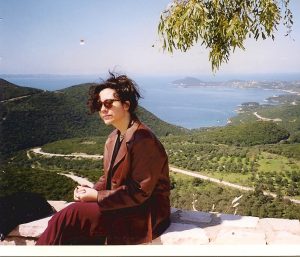 Where in the world do you live? And, are you from there?
Where in the world do you live? And, are you from there?
Well, this may be the most difficult question to answer!
I’ve lived for the last twenty years in the northwestern mainland area of beautiful Greece. By birth I’m British as were my parents and grandparents, although I’ve had dual nationality – British/Greek – for about a decade. I was born in England but my family relocated to Australia when I was about 3 years old and so I started my primary education in Sydney. Due to family problems, we left Sydney when I was about 8 and returned to the UK where I was based until I finished my A levels. I decided to go to Berlin, Germany to do my gap year before starting my degree course. I was so intrigued by the culture, language and endless opportunities in Berlin that I extended my “gap year” to THREE gap years before finally starting my degree course in the UK! Once I’d gained my BA (Hons) qualification I immediately came to Greece on a teaching contract and have lived here ever since!
So, to cut a long story short, let’s say I’m a Brit by birth, Aussie by nature with a sprinkling of Greek/German regarding my greedy appetite for tasty food and chilled beer!!!
What language(s) do you speak?
My native language is of course English and I have a high level of modern Greek and German. Until I was in my 20’s my French was passable but I honestly think that Brits shouldn’t try to speak this flowing and poetic tongue unless they REALLY make an effort to get the accent RIGHT! I haven’t been to France since my 20’s so, alas, I’ve probably forgotten most of what I knew.
When did you first become a mother?
I first became a mother in my early 30’s which is relatively late for Greek standards although fairly normal for British women.
Are you a stay-at-home mom or do you work?
The idea of not working on a permanent basis absolutely TERRIFIES me! I’ve worked on both a volunteer and professional basis since I was 15 and if I have periods of a month or more when I stay at home it ends up in a bout of depression. Always. Short holidays are pleasant but not for extended periods of time. That’s why I continued teaching right up to the birth of both my boys and continued to work from home (doing private tuition) while I breastfed them. I love teaching and being with teens gives me both pleasure and lots of positive energy. I’m addicted to it and believe that staying home and being a full time mother is MUCH harder and challenging than working outside the home!
Why do you write?
I learnt to read and write before I went to school as I was one of those tiring kids who could never sit still. Books and words fascinated me and when I was 5 I made a small folder with VERY short stories and plays! No piece was more than 50 or 60 words but I thought I was a Genius! I used to force my brother and friends to act out the scenes and dialogues I wrote, fantasising about how much smarter than them I was!!! What an obnoxious and bossy child I was!
The death of my mother from cancer when I was six and a half certainly knocked me down to earth and cured me of my bossiness, though. I hardly spoke at school and almost never at home for about 2 years after that so writing became my main form of communication with the outside world. Books and words got me through those terrible years. Writing was my escape from cruel reality.
In my adult life, writing is my main means of socialising as I live in a fairly isolated region of mainland Greece. I have 3 herniated spinal discs which means I have to limit the amount of driving I do. I don’t have the luxury of just popping over to a friend’s house for a coffee as it entails at least an hours’ drive.Too painful for me! So, writing saves me as I can express myself on a practical, emotional and creative level! I’m working on a children’s book at the moment, too, so my creative side is being constantly fed! Basically, writing keeps me sane!
What makes you unique as a mother?
Every mother has her own stamp or parenting style. When I was pregnant I used to really worry about how I would interact with my child. Every mother wonders about that of course but remember, my own mother had passed away when I was six. I didn’t have a role model or a standard to follow. My father didn’t remarry and he worked full time so it was up to me to look after my brother, cook, clean and of course get good grades at school! So, in a way I was a mother to my younger brother from a VERY early age. I went from being a brat and know-it-all to a mini-momma by the age of 8. I didn’t really have a typical childhood at all!
This is what makes me unique as a mother. I am very wary of over pushing my 13 and 14 year old sons in a very competitive culture. I’m hyper-aware of their emotional state and they can REALLY talk to me about most of the things that bother them. I believe the way I had to grow up has made me more empathetic and sensitive than most European mothers are.
What do you view as the challenges of raising a child in today’s world?
Wow- the list is endless!!!
In my house a major challenge is to encourage our boys to be open-minded and embrace people of other cultures, religions and world views. Most Greeks tend to be pretty narrow minded towards anything or anybody non-Greek! From primary school level especially, there is a very negative attitude towards children from certain countries such as Albania and Bulgaria. My blood really boils when my boys come home and repeat racist comments they have heard at school!
Despite such easy internet access nowadays to a plethora of global information, many parents and teachers in Greece are ignorant of other cultures, education systems and religious views. In an attempt to combat this, we hope that by using reason and examples of our personal friends from these cultures, we can get our boys to see that these stereotypical accusations are ridiculous. One of the most trustworthy employees we’ve ever had was from Albania and one of my closest female friends looks like a model, has the heart of Mother Theresa and is a Mathematics Professor at University level. She’s also Albanian!
So by our own personal interaction and logical arguments, our children see for themselves the opposite of what they sometimes hear and experience at school.
We have also told our boys about experiences I had when I first came to Greece and they feel shocked when they see how it is when someone they love is at the receiving end of an unjust system.
I’ve encountered many problems over the years both social and legal. We talk to our children about all these past experiences and encourage them to put themselves in other peoples shoes before acting. Also, the family saying is ALWAYS be fair and just. We try to teach our boys that if we treat others as we would like to be treated, then the world would improve dramatically!
How did you find World Moms Blog?
I was introduced to the blog by a very dear friend and writer/blogger, Heather Kelly. She has known me for some years and suggested that I might enjoy reading about motherhood all over the globe! Cheers Heather!
Thanks for inviting me to this super blog! My childhood trait of talking about myself has obviously never been subdued!
Take care wherever you may be!
World Moms Blog welcomes Ann Marie. Photo credit: Ann Marie Wraight.

Having lived in 4 different countries, Ann Marie finds it difficult to give a short answer about where she's from. She regards herself: Brit by birth, Aussie by nature, with a sprinkling of Greek and German based on her insatiable appetite for tasty food and chilled beer!
This World Mom has been married to her Greek soulmate for 16 years and they are the proud but constantly challenged parents of two overactive teenage boys. (She secretly wonders sometimes if she was given the wrong babies when she left the maternity clinic.) She can't explain the fascination and ability that her 13 and 14 year-olds show in math and physics or that both boys are ranked 1st and 2nd nationally in judo. Ann Marie can only conclude that those years of breastfeeding, eating home cooked meals and home tutoring really DO make a difference in academic and physical performance! The family is keeping its fingers crossed that---with the awful economic crash in Greece---continued excellence in math and/or judo will lead to university scholarships...
In addition to writing, enjoying a good glass of wine and movies, Ann Marie also works as a teacher and tends their small, free-range farm in the Greek countryside.
More Posts

by Maryanne W. Waweru | Jul 3, 2014 | 2014, Kenya, World Interviews

Where in the world do you live? And, are you from there?
I am in Kenya, East Africa. I live in the capital city of Nairobi. This is my home country, and I have lived here all my life.
What language(s) do you speak?
I communicate in fluent English and Swahili, which is our national language.
When did you first become a mother?
I first became a mother in April 2011 when I had my first son. I became a mother for the second time in April 2013 with the birth of my second son.
Are you a stay-at-home mom or do you do other work inside or outside the home?
I work as a freelance journalist, so most of the time I work from home.
Why do you blog/write?
I blog because I have a passion for informing and educating people (hence my journalism work). I specifically blog about motherhood because there is so much information that we moms could do with. Especially, because there is no manual to motherhood, you just learn things along the way. So why not learn together and from each other?
How would you say that you are different from other mothers?
I really can’t say I am different from other mothers, as I see that we all go through the same challenges and have the same desire to give the best to our children. I can only say that I am extremely passionate about ensuring that our experiences and our learning moments as mothers are captured somewhere. I try to capture these moments on my blog.
What do you view as the challenges of raising a child in today’s world?
For me it has got to be the fact that we are living in a very individualistic world, especially we who live in urban areas. Long ago, it was the entire village that would raise a child, but nowadays children are raised by their parents alone (and some are raised solely by the nannies as parents are too busy with work). When I was growing up, I knew all the homesteads within a 10 km radius, and could name all members of each household.
But that is not the same nowadays, where even knowing your next door neighbour is too much work! Society is so busy, with technology (computers, cell phones, video games) lessening the interaction of both parents and children. I fear my sons may never enjoy what ‘communal parenting’ is like.
How did you find World Moms Blog?
On twitter!
This is an original post to World Moms Blog by Maryanne W. Waweru of Mummy Tales.
Photo credit to the author.
Maryanne W. Waweru, a mother of two boys, writes for a living. She lives in Nairobi, Kenya with her family. Maryanne, a Christian who is passionate about telling stories, hopes blogging will be a good way for her to engage in her foremost passion as she spreads the message of hope and faith through her own experiences and those of other women, children, mums and dads. She can be found at Mummy Tales.
More Posts - Website

by Cindy Levin | Jul 1, 2014 | 2014, Economy, World Bank, World Interviews, World Voice
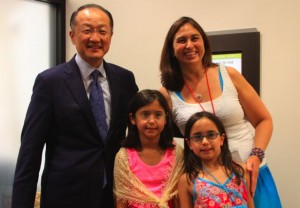
What is the World Bank and what does it do? If you ask an average American, you’ll likely get a blank stare or a wild guess. “Is it like when we played Monopoly as kids and one person got to hand out all the money?” quipped Mackenzie Astin on Vox Populi Radio recently when host Sean Astin tried to explain it to him. “It’s probably where all the countries keep their money,” said my 8-year-old to her sister. Whatever the answer, you’ll usually not hear “they fight poverty” as a first guess, but that’s exactly the key to what an everyday person should know about the World Bank.
While attending the 2014 RESULTS International Conference in June, my daughters and I had a chance to meet World Bank President Dr. Jim Yong Kim moments before he took the stage for an interview in front of hundreds of RESULTS volunteer activists who work every day to end poverty. While we awaited his arrival, I had time to reflect on the role of this man and the World Bank on what kind of world my kids will inherit from my generation.
The World Bank is a United Nations financial institution that provides loans to developing countries. Yet it’s not a bank in the ordinary sense. It’s a partnership that exists to reduce poverty and support development of impoverished nations. Imagine that…a bank with a mission to fight poverty! It provides low-interest loans, interest-free credits, and grants to developing countries to fund programs like education, health, agriculture, and environmental resource management. Where does the money come from? Donor countries, banks, multilateral institutions, and private sector investors all contribute to this vital source of financial and technical assistance to developing countries around the world.
Dr. Kim’s audience cheered wildly that day, holding signs saying “We love the World Bank” because they knew he was going to re-assert the World Bank’s mission end extreme poverty by the year 2030. In fact, the World Bank has set two goals for the world to achieve in that time:
1. End extreme poverty by decreasing the percentage of people living on less than $1.25 a day to no more than 3%
2. Promote shared prosperity by fostering the income growth of the bottom 40% for every country
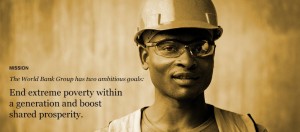
Wow. That’s only 14 years from now. In 2030, my 10-year-old will be 26 years old. Is it possible that in their adulthood, my children could live in a world without extreme poverty? Will they actually have to explain to their children what it was like when millions of people struggled to live on less than $1.25 a day because that kind of suffering won’t be found on the news?
Dr. Kim spoke of his belief that we should focus on the moral imperative to end poverty and shoot for big goals even before we precisely know how to get there. He said our attitude should be “balancing between moral reasoning and the humility that we may not have everything together…but going for it anyway because it’s the right thing to do.” Helping to save lives and educate children is a goal in itself. Plus, evidence for economic benefit of poverty elimination has now caught up with the ethics. For instance, 24% of economic growth is due to better health outcomes. We also now have evidence to show that education is not just nice to have…it’s necessary for growth. So, we should not be afraid to set the incredible goal and then work backward and say, “To achieve our goal, what kind of organization do we need to be to meet that?”
Is Dr. Kim an idealist? Yes, I do think so, but he’s an idealist in the very best way. He has a grand vision of what is possible coupled with a practical leadership style revealed in his insistence on “results based financing.” He wants the World Bank to focus on impact on the ground rather than getting money. When we can report incredible results like a neo-natal mortality drop in Argentina of 74%, donors witness what is possible and invest more.
The path Dr. Kim describes toward the end of extreme poverty is in no way easy. For one thing, it requires confronting the status quo and our assumptions about what works. We need to ask tough questions of organizations providing services, like, “Are you where the poor people are? Are your clinics convenient for you or for the people in poverty who you serve?” The World Bank has a critical role to measure and release regular data about poverty using sophisticated techniques so that we can make great decisions, inspire more funding, and get great results.
In summary, he concluded for us,
“We are not a hard-hearted organization just focused on increased GDP. We are dedicated to ending poverty and making sure that everyone participates.”
All in all, I feel extremely lucky. I feel lucky that I had a chance to meet a man of such vision. I feel lucky that as an advocate for global health and education in this era, I – personally – have a role in bringing about the end of extreme poverty. But most of all, I feel very hopeful and fortunate that if we work together with leaders like Dr. Kim, my daughters will see the end of extreme poverty within their lifetimes and millions more mothers will see their babies grow to be as strong and healthy as mine.
This is an original post written by Cindy Levin for World Moms Blog.
Cynthia Changyit Levin is a mother, advocate, speaker, and author of the upcoming book “From Changing Diapers to Changing the World: Why Moms Make Great Advocates and How to Get Started.” A rare breed of non-partisan activist who works across a variety of issues, she coaches volunteers of all ages to build productive relationships with members of Congress. She advocated side-by-side with her two children from their toddler to teen years and crafted a new approach to advocacy based upon her strengths as a mother. Cynthia’s writing and work have appeared in The New York Times, The Financial Times, the Washington Post, and many other national and regional publications. She received the 2021 Cameron Duncan Media Award from RESULTS Educational Fund for her citizen journalism on poverty issues. When she’s not changing the world, Cynthia is usually curled up reading sci-fi/fantasy novels or comic books in which someone else is saving the world.
More Posts - Website
Follow Me:


by World Moms Blog | Jun 21, 2014 | 2014, Belgium, India, New Zealand, Purnima, South Africa, Tara B., The Alchemist, ThinkSayBe, UK, USA, World Interviews
This week, the World Moms were found discussing the FIFA World Cup 2014 football. Here is what they answered to the question –
Is your country playing the World Cup? If not, what team are you rooting for and why?
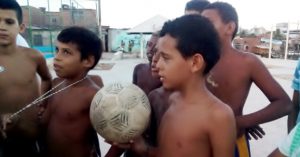
The kids in the favela in Recife talking about football
Jennifer Burden of New Jersey, USA says: When it comes to the Olympics, I am Team USA all the way!!! But the World Cup is a little different for me. I root for USA and England because my husband grew up watching England play and our family in the UK is involved with the FA there. It’s both a country and a family thing for me and my kids!
Sophia of Florida, USA says: This is very nationalist of me or … continental of me, but I go for any African country. I think this year the World Cup should have told Brazil police they need to stop killing children from the favela & as they have continued, the World Cup either needs to bring it up in mass conversation whilst there, or not hold the event there at all.
Check these news articles here and here.
Simona of South Africa says: Even though I live in South Africa, my husband and I are Italian and Italy is the only team I REALLY support! If Italy isn’t playing I root for Spain (my mom-in-law was half Spanish) then South Africa (although their soccer playing is worse than the Italians playing rugby)!!
Hannah Ashton from United Kingdom says: I’m a dual UK/US citizen. I’m not massively into football but I like the World Cup games. I root for England first and USA second. If either of those teams win I would be very happy but very surprised!
Maman Aya of New York, USA says: We are USA fans all the way in this house, unless they don’t make it, then we root for the underdogs.
Karyn Van Der Zwet of New Zealand says: Not sure if we are or not. (You can probably tell how much I’m into it. )
TaraB of Washington, USA says: of I cheer for USA but will watch any match. My father is a huge soccer fan, and we always watched the World Cup. We made signs, decorated, and created special food even though it was just us in the basement. And when the USA hosted the Cup back in the 80’s or 90’s, my dad took each of us kids to a game. I saw Norway play Ireland in a 0-0 draw. It was still one of the most amazing experiences. The people from all over the world … the costumes … such fun!
K10K of Belgium says: Belgium is in, so we (mostly the kids) will be following and cheering! It’s like the entire country has gone mad!
Purnima of India says: I already wrote about it elaborately here. India is completely a cricket-crazy nation. In our household, (mostly my son) is supporting Brazil for reason known to himself. I am of course partial to Brazil myself, but I am happy to see the most talented team win.
Did you all catch our World Moms’ posts the past week about the World Cup? EcoZiva from Brazil wrote about it here and Purnima from India wrote about it here. Two different countries talking about it in two different ways.
What about you… Which country do you support for in this year’s World Cup?
This post has been compiled and edited by World Mom, Purnima of India. Photo credit to her.
– World Moms Blog
World Moms Blog is an award winning website which writes from over 30 countries on the topics of motherhood, culture, human rights and social good. Over 70 international contributors share their stories from around the globe, bonded by the common thread of motherhood and wanting a better world for their children.
World Moms Blog was listed by Forbes Woman as one of the "Best 100 Websites for Women 2012 & 2013" and also called a "must read" by the NY Times Motherlode in 2013. Our Senior Editor in India, Purnima Ramakrishnan, was awarded the BlogHer International Activist Award in 2013.
More Posts

by Purnima Ramakrishnan | Jun 11, 2014 | 2014, Brazil, Cultural Differences, Culture, Eye on Culture, India, Purnima, Sports, The Alchemist, World Interviews
Every four years, a large part of the world’s attention descends on one nation – for World Cup Football. Tomorrow, the FIFA World Cup actually starts, and as you all know, the first match is in Sao Paulo, where Brazil takes on Croatia. I was on the phone with fellow World Moms Blog editor, Jennifer Burden, and she asked me if India is excited for the World Cup.
My own family has World Cup fever, inspired by my recent trip to Brazil to report on world poverty and environmental issues, but when I think of the whole of India excited about something sport-related, it is really only cricket that comes to mind!
People in India will watch the World Cup games, but it won’t compare to our country’s level of excitement over cricket.
When it comes to sports, India is a cricket-crazy nation.
INDIA.IS.A.COMPLETE.CRICKET-CRAZY.NATION!
Men, women and kids all watch and/or play and/or have favorites and/or conduct mass prayers and/or do just crazy things for the sake of cricket. There is really no end to it!
Sachin Tendulkar, a cricket player, is like a God to everyone in India. And there is absolutely no limits to what people would do for cricket. It is not just a game. Cricket has a very special life and a very special relationship with this country. It cannot even be explained, however, living in India during the cricket season would say it all.
Let me entertain you with a few crazy things that go on in India around cricket…
People color themselves with the tricolor Indian flag. The tricolor theme is not just clothes and caps, but you can find it also in the school premises, in apartments (flats) — theentire nation in is the colors of the Indian flag for the cricket. The celebrations are as intense, if not more, (ok, I have to be honest- it is the most celebrated event) than even Diwali or the Independence Day.
Check out this picture of a school in Western India where the school children are rooting for the Indian cricket team.

And then people just form throngs everywhere during the actual time the game is telecast. Office-goers, housewives, school-children, get together wherever there is a TV and watch. Homeless people watch cricket on the TV sitting on the streets across an electronics shop (or TV shop). No, they aren’t driven away. Because it is cricket season.
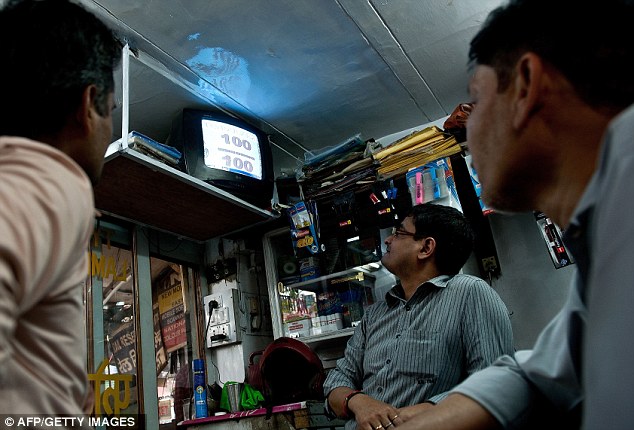
Shopkeepers let the customers watch the match from the shop indefinitely
There are common TV viewing holes in villages like the local tea-stalls, community centers, even movie theaters at times, a common TV in the square of the slum. Oh, there is no end to this kind of thing. These pictures to do the job of explaining the craziness cricket causes for the people of India and the rest of sub-continent countries (Pakistan, Sri Lanka and Bangladesh).
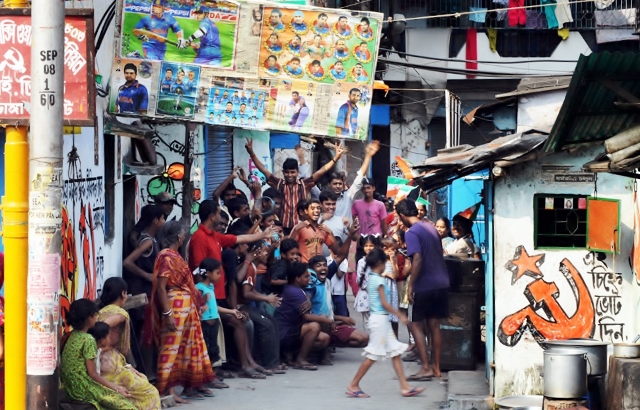
A tea stall hosting the TV viewing of the cricket match to a gathered crowd of the villagers
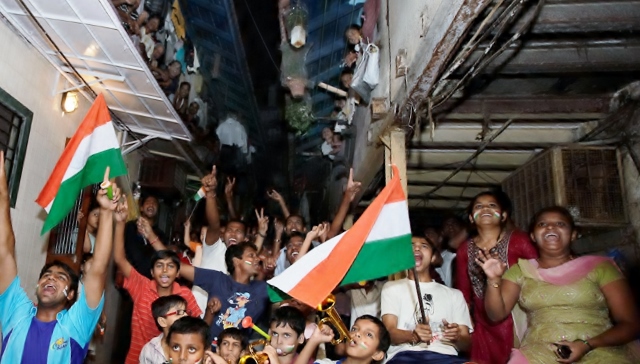
The slum dwellers watching the cricket match from a local TV-hole in the slums.
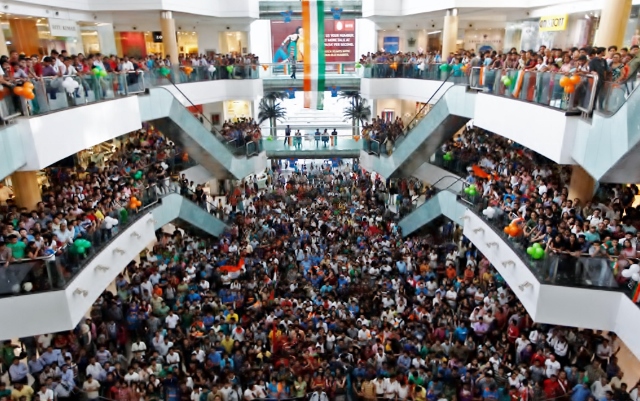
This is a mall in Kolkatta where the finals of the match between India and Sri Lanka is viewed.
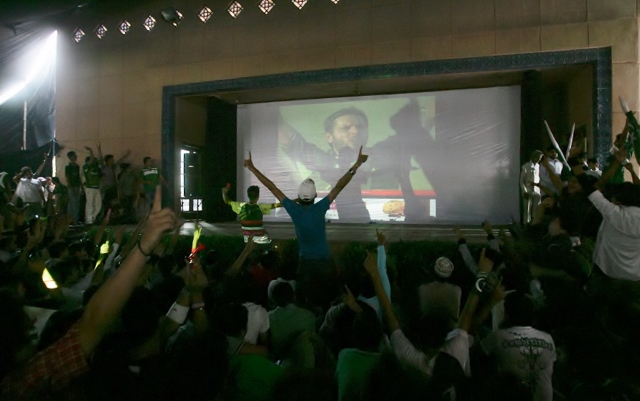
This is a movies theater in Karachi, Pakistan where cricket is telecast during the cricket season.
So, now coming back to the FIFA World Cup to be held in Brazil, all that I would say is that, the temperature is slightly lukewarm in comparison to the fever of the cricket playing nation.
Yes, we do talk a lot about it. But I guess that is about it. And, perhaps, some real football fans would watch it because they are really that – football fans.
By the way, did you catch Brazilian World Mom, Eco Ziva’s, post on the World Cup this week?
So what happens in your country? Is it a football-crazy country too? Or does your country live for some other sport?
Photo credit to the author, The Daily Mail and The Atlantic.
This is an original post to World Moms Blog written by Purnima Ramakrishnan, our Senior Editor from India.



























